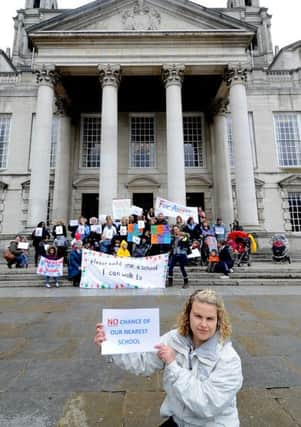Leeds had ‘highest number’ of parents missing out on preferred primary school places


Primary places has caused major controversy in the city with a campaign group being launched over claims that parents in parts of Roundhay, Moortown and Alwoodley were living in a “places blackhole” with no chance of getting into local schools.
Now new figures from the Department for Education show the city had the highest level of parents missing out on their first choice school in Yorkshire and the joint highest number of parents of anywhere in the North of England who saw their children allocated to a primary school they did not choose.
Advertisement
Hide AdAdvertisement
Hide AdTables published today show that of the 9,712 people who applied for primary school places in Leeds, starting this September, almost 15 per cent did not get into their first choice and 5.6 per cent were given a school they did not choose.
Paul Brennan, Leeds City Council’s deputy director of children’s services said these figures were a “snapshot” of the situation on National Offer Day and “did not not reflect all of the hard work which has gone in to securing new places since then.”
He also said the number of applications was especially high, with 500 more applications than two years ago, but despite this 95 per cent of children got into one of their preferred schools.
Following the high profile parents campaign Leeds City Council was able to secure 90 more places at Gledhow, Wigton Moor and Highfield Primary schools meaning more parents got into one of their preferred schools. This was hailed as a victory for the Fair Access Group. It was formed when around 80 parents in Roundhay, Moortown and Alwoodley came together after missing out on any of their preferred schools - despite saying they all applied to local primaries.
Advertisement
Hide AdAdvertisement
Hide AdTheir campaign saw questions being put to both David Cameron and George Osborne on the General Election campaign trail and a rally being held outside Civic Hall.
Campaigner Lucy Clement said: “The new figures show how the extra places created by Leeds City Council were really needed and the extent of the problem we were facing locally in comparison to what was happening elsewhere.”
Some of the parents had originally objected to being placed at a free school they did not choose miles from their homes.
The Khalsa Science Academy was due to move from Chapeltown to Alwoodley, in September, and the council placed pupils there based on how close they were to the intended site. However the move was delayed meaning pupils face a commute of several miles to its temporary base in Chapeltown. Now Khalsa has told parents it will be moving to Alwoodley in September 2016.
Advertisement
Hide AdAdvertisement
Hide AdIn a letter to parents the school’s principal Brendan English said: “Following a number of discussions with the Department for Education and Khalsa Education Trust the decision has been made to postpone the move to our new premises to September 2016. At Khalsa we are committed to providing an outstanding education for our pupils and as such we feel that relocating to a completed site as opposed to opening during the build phase will be of maximum benefit to our pupils.
Although opening a free school during a build phase is quite common, we feel that while we have more than sufficient temporary premises we should continue to deliver education within the Chapeltown site to ensure minimal disruption to the children’s learning experience.”
Mr Brennan said: “While we welcome the contribution free schools, like Khalsa, can make to our city’s educational community, they can cause uncertainty when it comes to planning places. Our admissions policy requires us to allocate places based on the school’s permanent location which, when delays like this happen, mean further disruption for those families who live a distance away from the temporary site.”